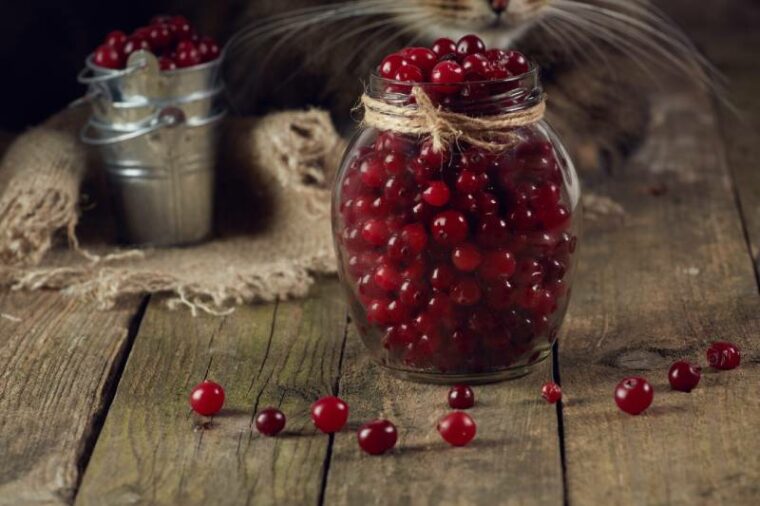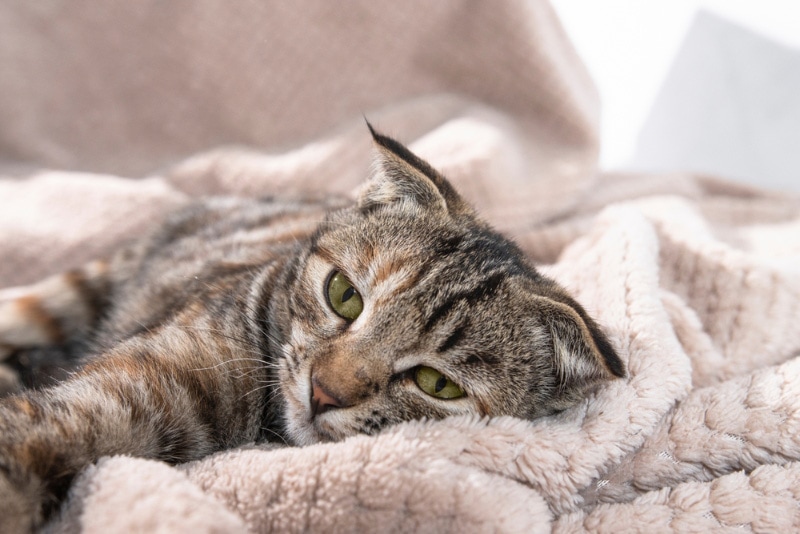
Click to Skip Ahead
Cranberries are excellent for so many different things! We all know just how much cranberries benefit a human’s daily diet. But how about your cat? After all, cats are obligate carnivores and get most of their sustenance from animal protein sources.
However, cranberries can, in fact, be a beneficial additive to your kitty’s diet. Naturally, they won’t be a main staple by any means, but they certainly have their perks and benefits. Here, we will discuss all of the wonderful benefits of cranberries themselves and how they can help your cat.
Cats Can Eat Cranberries
Even though cats are carnivores, they can still have occasional plant material in their diet. While you might not see a wild feline snacking on cranberries in the wild, our domestic cats have a different dynamic when it comes to diet.
Over time, they have gotten used to plant content being in their diets. Also, some cats might snack on plants like catnip, cat mints, and even wild grasses to calm their stomach and provide a source of fiber content or just because they are investigating.
Like some other plant-based materials, cranberries are certainly OK for cats to consume in controlled quantities. However, moderation is key. Also, the type of cranberry product you feed your cat will affect its effectiveness.
As you read further, we will discuss the differences between the types of cranberry products you might feed your cat and the power supplements you can have.

Cranberry Nutrition Facts
Benefits of Cranberries for Cats
Cranberries are an antioxidant-packed fruit that has a wide array of health benefits when portioned correctly. Here are a few nutrients found in cranberries that affect your cat’s overall health.
Cranberries Are Packed with Vitamins and Minerals
Cranberries have an incredibly high amount of vitamins and minerals that help with your cat’s bodily functions.

Vitamin K
Vitamin K is responsible for making various proteins in the body that aid in bone building and blood clotting. Many other components, such as prothrombin and osteocalcin, are proteins that require vitamin K to do the job.
Vitamin C
You might know that vitamin C is notorious for boosting immunity in humans. The same goes for cats. It is an incredibly vital nutrient that keeps your cat’s defense strong against illness. However, unlike humans they make their own in their bodies and don’t usually require supplements.
Copper
Copper is a vital mineral in your cat’s body that helps with the production of red blood cells, supporting your nervous system and immunity. Copper also plays a key role in forming collagen and connective tissue. In addition, copper acts as an antioxidant to reduce free radicals.

Iron
Iron will help your cat’s body perform many vital functions, including in the gastrointestinal and immune systems. It also plays a crucial role in regulating body temperature. The lack of iron in the body can lead to anemia.
Magnesium
Magnesium is an essential mineral that aids in regulating muscle and nerve function. It also helps keep blood pressure at healthy levels.
Cranberries Improve Urinary Health
You might have heard that cranberry juice is an excellent thing to drink and that it can help treat urinary tract infections (UTIs). We have all heard that cranberries have some type of component (proanthocyanidins) that makes them very beneficial for urinary health, however, is the same true for cats?
The same benefits are thought to extend to our feline friends in certain circumstances which is good news.
Cranberries are also very low in potassium but high in vitamin C. This combo makes them helpful for the kidneys as well.
Downfalls of Cranberries for Cats
As we mentioned above, since your cat is a carnivore, they thrive on a diet with mostly animal-based proteins. Since cranberries are a highly acidic fruit, they are certainly not meant for everyday consumption.
You might see cranberry as an ingredient in your cat’s food, which is perfectly acceptable. However, as a standalone snack or supplement, it is not intended to overpower the regular components of their diet.
So, as healthy as they can be, you will certainly need to keep track of how much you’re giving your cat to ensure it causes no systematic upset.

Avoid Sweet Cranberry Snacks
When you think of cranberries, you might think of something sweet like cranberry salad, candies, juices, and otherwise. Anything with added sugar or other questionable ingredients should be completely avoided. You should only give your cat essential fruits or cat-friendly supplements instead.
Giving your cat sweets can lead to obesity and, fun fact, cats can’t taste sweetness anyway! That’s right. Since cats are obligate carnivores, their palate never formed to detect sugars. So sweets serve your cat no purpose and just lead to unwanted health issues like obesity and diabetes.
Knowing exactly what your feline companion can and cannot eat will help you become the best pet parent. Recognizing that not all cat bowls are equal is also key! The Hepper NomNom Cat Bowl sets itself apart from traditional options by catering to the specific needs of cats. The innovative design offers whisker relief via shallow dishes and promotes digestion with a slight bowl elevation. Find out if the Hepper NomNom is right for your cat by clicking here.
At Pet Keen, we’ve admired Hepper for many years and decided to take a controlling ownership interest so that we could benefit from the outstanding designs of this cool cat company!
Do Cats Like the Taste of Cranberries?
Cats are peculiar creatures. We know this is true—some of them like the taste of the weirdest things. Overall, most cats probably won’t be interested in the taste of cranberries as they are naturally bitter. However, that certainly does not stand for all cats.
Your cat might very well love the taste of cranberries and try to eat them every chance they get. However, if you’re adding cranberries into your cat’s diet, it might be something that you want to put in their daily diet in supplement form.

Cranberry Supplements for Cats
Most cranberry supplements on the market are geared toward urinary health. Not all supplements are created equal. It is essential to check the reviews and the ingredients to ensure your cat is getting a healthy and helpful product.
You can typically find these supplements in capsule or powder form. You can add most of them to their regular diet, preferably wet cat food, to make consumption much easier.
Final Thoughts
So, just be aware that cranberries are not a dietary staple in your cat’s diet. However, they can be an excellent supplement to add to their diet, particularly in the area of urinary health.
Remember that sweets are not good for your cats, and they can’t taste them anyway! So make sure to keep any sugary cranberry snacks away from your cat. As with everything, always add cranberries to your cat’s diet in moderation for optimal results.
See also:
- Can Cats Eat Cranberry Sauce? Vet Reviewed Nutrition Facts
- Can Cats Eat Strawberries? Vet Reviewed Facts & FAQs
Featured Image Credit: Alexey Hulsov, Pixabay









